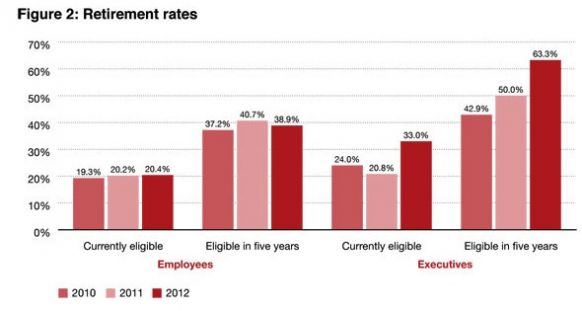From 2011 to 2012, retirement eligibility rates for utility executives jumped 50 percent. Although the increase is significant, it is not even the most critical change management task most utilities are facing.
A new report from PwC, Power and Utilities Changing Workforce, outlines the layers of risk many utilities face. Not only are many workers retiring, but benefit costs are also very high, and the first-year turnover of new employees has gone up and is expected to rise even more.
“As a result, traditional 'word-of-mouth,' on-the-job training of utility workers is not sustainable,” the report states.

The report goes on to note that many older employees have stayed on during the recession or remained as contractors, which has “has helped perpetuate the conservative, consensus-driven culture that has challenged innovation in the industry.”
PwC explicitly questions whether older workers will really want to change tack 30 years into a career, while also calling on those workers to literally take notes documenting their intellectual capital instead of assuming they will just pass it along verbally to the next generation.
The issue is that younger workers learn differently and are expecting a different workplace than some staid utilities may provide. Some are adapting quickly; others are not. “While some organizations have been experimenting with new digital technologies and e-learning approaches to attract and retain younger people,” the report states, “most still lack appropriate training skills and procedures.”
Forward-thinking utility workers, often those closer to retirement, are beginning to question whether they and their peers should choose retirement in order to open up the utility industry to a new way of doing business.
But it’s not as simple as fresh blood. Even a utility with grand plans to reinvent its service can be hampered by regulation. Although new workers may be thrilled with more automated, high-tech processes, there is a large amount of intellectual capital that could be left behind as an entire generation of workers retires.
PwC does not paint a rosy picture of the challenges, but it also goes on to identify three core areas where utilities can improve and pave the way for a smoother transition to a new way of doing business.
- Knowledge retention and succession planning. Make a roadmap to address knowledge transfer, as well as process, systems and data management, PwC urges. “Succession planning has become much too critical an issue to relegate to an annual meeting with HR.”
- Operations. On-the-ground training is important, but so are task lists or job plans. One utility, PwC writes, made a list of major jobs that were going to need a task list and prioritized them in terms of when workers were leaving. To ease the burden of building the lists, an intern helped compile the plans from the employees.
- Technology and processes. As new IT systems are brought in, they must be accompanied by work rules so that the benefits of the new technology can be realized without losing any institutional knowledge.



